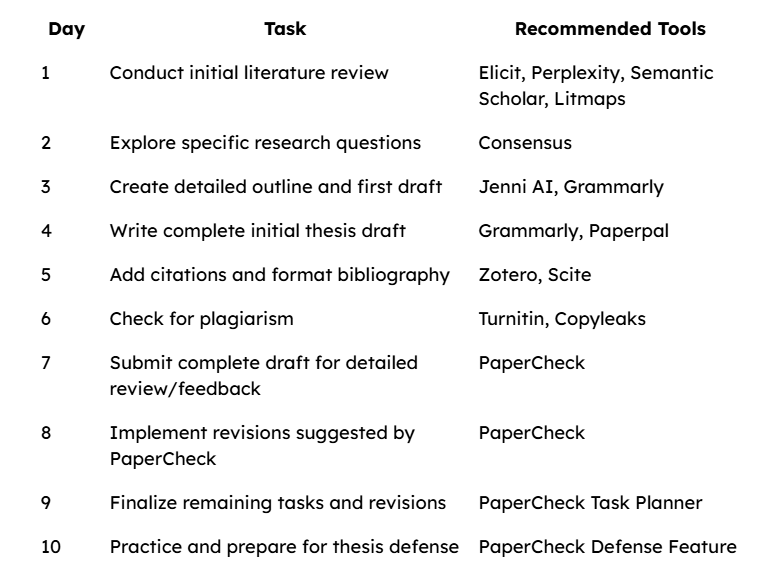Thesis Writing in 2025: Best AI Tools + How to Finish Strong with confidence.
Imagine it’s midnight, and you're facing your laptop screen, feeling overwhelmed by endless research tabs and unclear how to structure your thesis. Thankfully, it's 2025, and thesis writing has transformed dramatically, thanks to powerful new AI tools that help students research, draft, cite, and polish their academic work like never before.
Today, AI-tools such as ChatGPT and Perplexity have significantly reshaped the academic landscape. These tools have gained widespread acceptance because of their advanced abilities, including deep reasoning, context understanding, and real-time academic research integration, enabling students to produce high-quality academic work efficiently.
Best AI Tools for Academic Writing Categorized
1. Research & Literature Review
Elicit: AI-powered research assistant that finds relevant academic papers, extracts key information (like abstracts, methods, and results), and helps compare findings across sources. Great for speeding up literature reviews. Helps you ask structured research questions and automatically compiles answers from academic papers.
Semantic Scholar: Free, AI-powered academic search engine offering concise paper summaries, visual citation graphs, and filters to explore influential research across fields. Lets you quickly understand a paper’s impact and see how ideas connect over time.
Litmaps: Visualizes relationships between research papers over time using citation networks. Helps you track how research evolves and discover overlooked or emerging works. Ideal for uncovering new sources during your literature review and building a clear map of your research domain.
Consensus: Answers complex research questions by summarizing and aggregating findings directly from peer-reviewed studies. Gives "yes/no" or nuanced evidence-based responses. Perfect for validating claims, understanding debates in your field, or getting quick clarity on contentious topics.
Perplexity: An AI-powered search and answer engine that delivers real-time, cited responses from academic and web sources. Helps students find trustworthy, up-to-date information quickly and explore topics deeply with follow-up questions. Ideal for fast, citation-backed answers during literature review, clarifying complex topics, or comparing perspectives across disciplines.
2. Drafting & Outlining
Grammarly: Real-time grammar, clarity, and style checks, significantly enhancing writing quality. Helps clean up your writing quickly before deeper revisions or formal reviews.
Paperpal: Specialized editing platform tailored for academic manuscripts, refining structure and style. Focuses on academic language, technical fluency, and publication-level editing.
Jenni AI: Offers context-aware drafting suggestions integrated with citations, helping overcome writer’s block and ensuring academic integrity. Excellent for generating structured first drafts with integrated citation suggestions.
3. Citation & Formatting
Zotero: Manages and automatically formats citations and bibliographies in various academic styles, promoting accuracy and efficiency.
Scite: Provides context around citations, indicating if sources are widely supported, disputed, or merely mentioned, ensuring reliability.
4. Plagiarism Checking
Turnitin: The industry-standard plagiarism detection tool that compares your writing against a vast database of academic journals, student papers, and web content to ensure originality. Trusted by universities worldwide for high-stakes academic submissions.
Copyleaks: Advanced plagiarism detection tool that identifies not only exact matches but also paraphrased and AI-generated content supporting students in maintaining originality and avoiding academic misconduct. Especially useful for double-checking rewrites, paraphrases, and AI-assisted sections.
Limits of AI Tools for Thesis Writing
Despite their advantages, AI tools have limits:
- Struggle with nuanced academic tone and voice.
- Can overlook logical inconsistencies or gaps in reasoning.
- Difficulty handling complex structural and stylistic requirements.
These limitations highlight the critical need for human oversight in finalizing academic papers.
PaperCheck: Your Final Layer of Polish
PaperCheck steps in precisely where AI alone cannot:
- Provides feedback on structure, clarity, and content.
- Offers task planning tools to manage and complete writing effectively.
- Features a unique thesis defense preparation feature, generating realistic practice questions and constructive feedback.
- More affordable than traditional proofreading services, ensuring high-quality feedback is accessible to every student.
Sample 10-Day Thesis Workflow

Conclusion
The thesis-writing process has been significantly improved by the rise of AI tools making it easier to research, draft, check for originality, and prepare for defense. Each tool plays a unique role in helping students work more efficiently and confidently.
While AI can guide and support you through many technical and structural aspects, the responsibility for thoughtful, rigorous academic work still lies with you. Tools like PaperCheck complement this by offering detailed feedback on coherence, structure, and readiness especially when you're nearing your final draft.
By combining smart tools with your own critical thinking, you can produce a thesis that is not only polished but truly reflective of your academic voice.
From Gerald, 26th May 2025